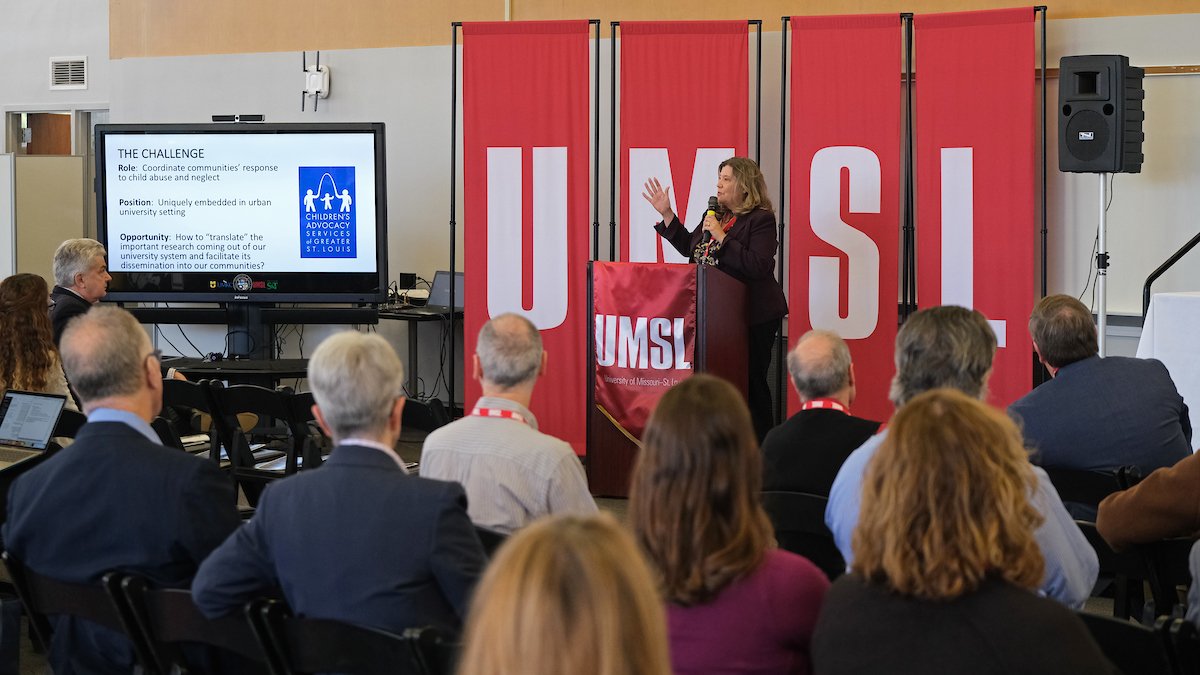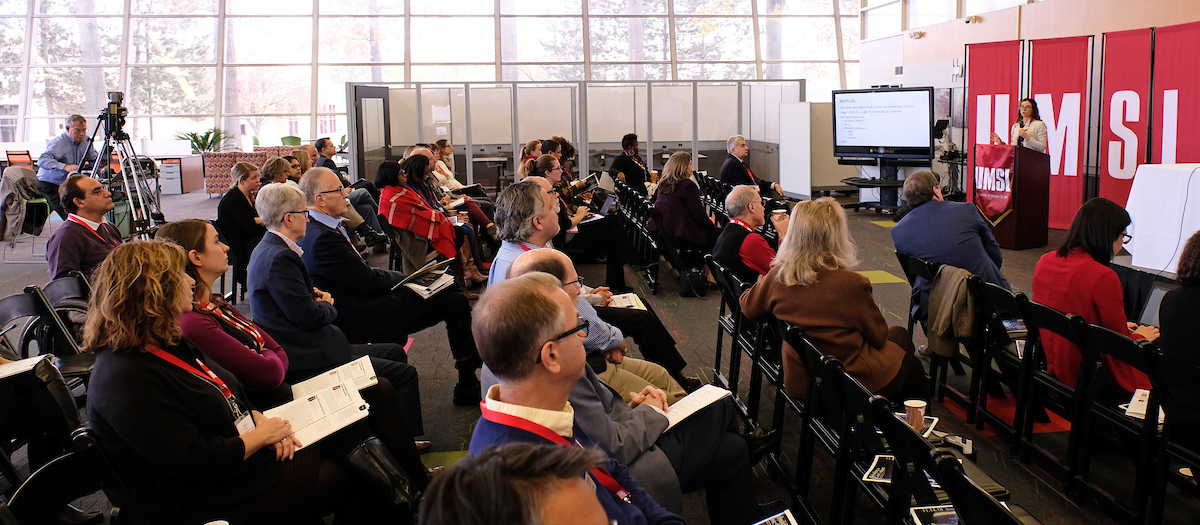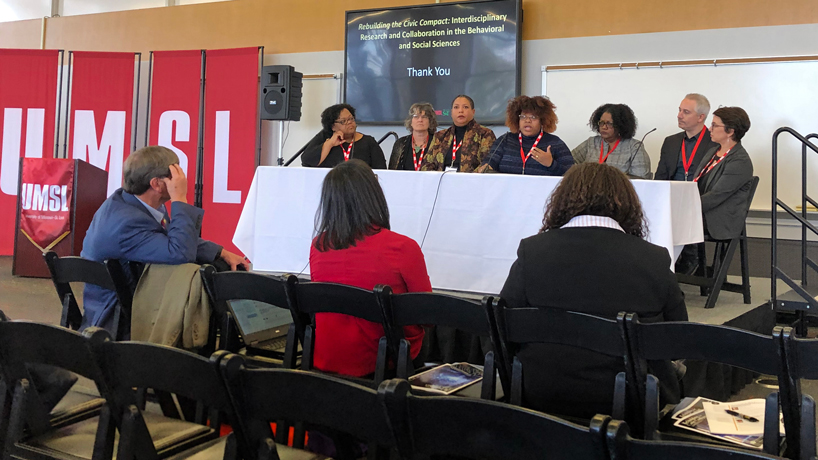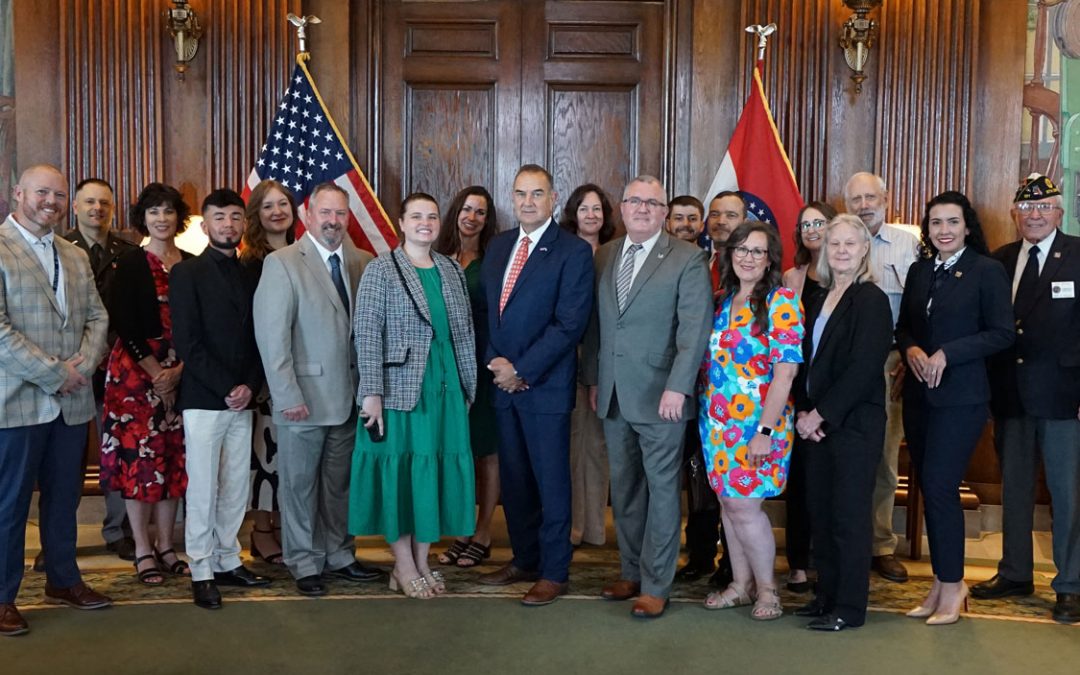
Jerry Dunn, the executive director of Children’s Advocacy Services of Greater St. Louis, discusses the roles universities can play in combating societal issues during Wednesday’s UM System Research Summit at the ED Collabitat. Dunn, a clinical professor of psychological services at UMSL, was one of 21 faculty presenters from across the system’s four universities. (Photo by August Jennewein)
The question came from the back of the room at the ED Collabitat on South Campus at the University of Missouri–St. Louis.
Clark Peters, an associate professor in the School of Social Work and the Truman School of Public Affairs at the University of Missouri–Columbia, had listened to a series of five-minute TEDx-style presentations from researchers across the University of Missouri System during the first session of Wednesday’s research summit.
The title of the proceedings was “Rebuilding the Civic Compact: Interdisciplinary Research and Collaboration in the Behavioral & Social Sciences.” The first set of presenters spoke on topics ranging from the opioid crisis and post-traumatic stress disorder that can accompany gun violence to the impact of adverse childhood experiences and the development of resiliency among at-risk populations.
“I was blown away by the presentations,” Peters said. “I happen to work with two people on the panel, and they’re the only ones whose work I’m familiar with, and I work in this space in trauma, in law, in forensics. I didn’t know about the good work you’re all doing.”
Then came his question: “To the extent you knew each other already – because you’re not on the same campus – how did you know about other system potential collaborators?”
Silence fell over the room as the presenters looked at each other on the dais. None seemed sure how to answer.
“That’s why we’re doing this,” the event’s moderator, Chris Spilling, interjected.
Indeed, one of UM System President Mun Choi’s primary goals for the research summits at the system’s four universities this year has been to spur greater research collaboration throughout the system.
“We find that we even have silos on campus,” said Spilling, UMSL’s vice provost for graduate studies and research. “We just had a research symposium for junior faculty members on campus. I think we had 21 speakers, a very similar format. We’ve already got collaborations coming out of that because the junior faculty heard what some of their colleagues do, and now they’re connecting on projects.
“So when President Choi initiated these summits, I think the intent was to find out what’s going on across campus and get these conversations started.”
Choi opened the event by welcoming nearly 100 people to the ED Collabitat and set the stage for the next three hours of presentations.

The audience listens attentively as UMSL Assistant Professor of Psychological Sciences Rachel Wamser-Nanney presents her research on “Trauma, PTSD and Attitudes Toward Guns” during Wednesday UM System Research Summit at the ED Collabitat. (Photo by August Jennewein)
“The important issues we’re going to be discussing range from addiction, opportunities in education, health disparities and access to opportunity, which is so key for many of us who live in metropolitan areas as well as rural parts of the state,” Choi said.
It was the presenters who shined throughout the event, sharing their research on a wide range of issues affecting people throughout Missouri and beyond.
To view the presentations, click here. They broke down into three areas:
Area 1. Addiction, Trauma and Gun Violence
- “Missouri’s Response to Our Opioid Crisis: What We’re Doing and Why” – Rachel Winograd, assistant research professor at the Missouri Institute of Mental Health, UMSL
- “Trauma, PTSD and Attitudes Toward Guns” – Rachel Wamser-Nanney, assistant professor of psychological sciences, UMSL
- “Strengthening the Civic Compact: Contributions a University Center Can Make” – Jerry Dunn, clinical professor of psychological sciences and executive director of the Children’s Advocacy Services of Greater St. Louis, UMSL
- “The Missouri Prevention Center: A Multidisciplinary Approach to Reducing the Prevalence and Burden of Youth Mental Health Problems in our Schools (Part 1)” – Wendy Reinke, professor and co-director of the Missouri Prevention Center, University of Missouri-Columbia
- “The Missouri Prevention Center: A Multidisciplinary Approach to Reducing the Prevalence and Burden of Youth Mental Health Problems in our Schools (Part 2)” – Aaron Thompson, associate professor and director of PhD studies in the School of Social Work and associate director of the Missouri Prevention Center, MU
- “Treatment Implications of the Association Between the Timing of Adverse and Relationally Positive Experiences and Children’s Outcomes” – Erin Hambrick, assistant professor of psychology, University of Missouri-Kansas City
- “Violence at the Intersection of Risk & Resilience: The Interlocking of Trauma and Triumph Among the Disadvantaged”– Toya Like, associate professor of criminal justice and criminology, UMKC
Area 2. Data-driven and Collective Action Approaches to Systems Change
- “Building a Regional Infrastructure for Community Change” – Paul Evensen, director of the Community Innovation and Action Center, UMSL
- “What Do We Make of Gentrification in Older Industrial Cities Like St. Louis?”– Todd Swanstrom, E. Desmond Lee Endowed Professor in Community Collaboration and Public Policy Administration, UMSL
- “25 Years of Behavioral Health Research to Practice” – Holly Hagle, assistant research professor in the Collaborative to Advance Health Services at the School of Nursing and Health Studies, UMKC
- “More Than One Fish: Building a Better Path for Missouri’s Most Vulnerable Young Adults”– Clark Peters, associate professor in the School of Social Work and Truman School of Public Affairs, MU
- “Brain Responses to Stress Predict Subsequent Trial-by-trial Smoking Decisions” – Lark Lim, associate professor of psychology, UMKC
- “Problematic Alcohol and Cannabis Use in College Students During Specific Events”– Amber M. Henslee, associate professor of psychological science, Missouri University of Science and Technology
- “The Cost of Contact with the Criminal Justice system” – Beth Huebner, professor of criminology and criminal justice and UM System Presidential Engagement Fellow, UMSL

Jeannatte Porter, an assistant professor of strategic communication at the Missouri School of Journalism, fields a question during the day’s third panel, dealing with “Community-informed and Engaged Approaches to Reducing Racial and Health Inequities.” (Photo by Steve Walentik)
Area 3. Community-informed and Engaged Approaches to Reducing Racial and Health Inequities
- “Six pillars for Effective Community Engagement” – Jane McElroy, associate professor of family and community medicine, MU
- “HPV Vaccination Approaches: Appealing to the Parents” – Monique Luisi, assistant professor of strategic communication in the School of Journalism, MU
- “Real Implementation Science: Building Student and Community Capacity to Address Diabetes Disparities in African American Communities” – Jannette Berkley-Patton, associate professor and director of the UMKC Community Health Research Group in the School of Medicine’s biomedical and health informatics department, UMKC
- “In the Pastor’s Study: How do African American Baptist Ministers Talk About Mental Health?” – Jeannette H. Porter, assistant professor of strategic communication in the School of Journalism, MU
- “Listening to the Voices of the Community” – Sheila Grigsby, assistant professor in the College of Nursing, UMSL
- “Closing the Gap: The Effects of Opportunities, Exposure and Experiences on Education Outcomes” – Brian Kisida, assistant professor at the Truman School of Public Affairs, MU
- “Aging & HIV in Sub-Saharan Africa: Making Visible the Invisible” – Enid Schatz, associate professor and chair of the Department of Health Sciences/Department of Women’s & Gender Studies, MU
Participating faculty members were grateful to learn about some of the other projects underway.
“I think often, particularly in the trauma field, we’re so busy just keeping our head above water that it’s difficult to look around enough and see that there’s other people with what could be very prominent life preservers for us,” Dunn said. “I’m really excited to be part of this opportunity and really look for some ongoing collaborations.”














